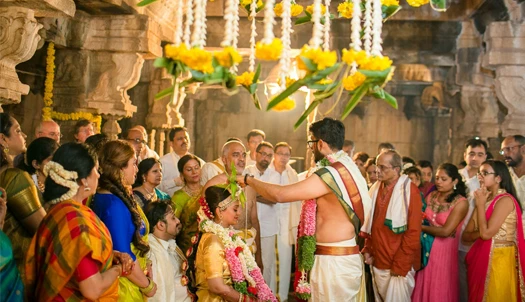
Wedding Culture In Puducherry.
Weddings in Pondicherry, a city in the Union Territory of Puducherry, reflect a rich blend of cultural influences. Pondicherry's unique history as a former French colony, coupled with its Tamil and general South Indian heritage, contributes to a diverse wedding culture. Here’s an overview of the key aspects of wedding culture in Pondicherry:
1. Religious and Cultural Fusion
Pondicherry is home to a mix of communities, including Tamil, French, and other Indian and international groups. As a result, weddings here can vary greatly depending on the religious and cultural backgrounds of the families involved.
Tamil Weddings: These typically follow traditional South Indian customs, including elaborate rituals, vibrant ceremonies, and rich vegetarian feasts. Key rituals often include the “Kasi Yatra” (the groom's mock journey to the holy city of Kashi), the “Vara Puja” (worship of the groom), and the “Thali” (tying of the sacred thread around the bride’s neck).
French Influence: The French colonial legacy might influence aspects of the wedding, particularly in terms of décor, venue, and some culinary aspects. French-style pastries and cakes might be featured alongside traditional Indian sweets.
2. Pre-Wedding Rituals
Like many South Indian weddings, pre-wedding ceremonies are significant and involve various rituals:
Engagement Ceremony (Nischayathartham): This is an important event where families formally agree to the union, exchange gifts, and perform rituals.
Mehendi and Sangeet: While Mehendi (henna) is popular, a Sangeet (musical night) might not be as prevalent as in some other regions, but it’s becoming more common.
3. Wedding Attire
Traditional attire plays a central role:
For the Bride: South Indian brides typically wear a silk saree, often in bright colors like red or gold, and adorn themselves with traditional jewelry, including a mangalsutra (sacred necklace).
For the Groom: The groom usually wears a dhoti and shirt or a more formal outfit like a silk kurta or suit, depending on the family's preference.
4. Ceremonies and Rituals
Weddings in Pondicherry often follow traditional South Indian rituals:
Vara Pooja: The groom is worshipped as a deity by the bride’s family before the actual wedding ceremony.
Kanyadaan: The bride’s parents give her away to the groom in a significant ritual.
Saptapadi: The couple takes seven steps together, each representing a vow or promise.
5. Post-Wedding Celebrations
Post-wedding customs can include:
Reception: This is a chance for families to celebrate the union with extended relatives and friends, often featuring a grand feast.
Grihapravesh: The bride is ceremonially welcomed into the groom’s home.
6. Cuisine
The wedding feast in Pondicherry often features a wide array of traditional South Indian dishes:
For Tamil Weddings: Expect a variety of rice-based dishes, curries, sambar, rasam, and a range of sweets like payasam.
Fusion Elements: French influence might bring in some continental dishes or desserts, especially if the wedding involves guests from different backgrounds.
7. Venues and Décor
Weddings can be held in a variety of venues, from traditional temples and community halls to more modern or even picturesque locations reflecting Pondicherry’s colonial charm. Decorations often include vibrant flowers, traditional kolams (rangoli), and other regional elements.
Overall, Pondicherry’s wedding culture is a fascinating blend of tradition and modernity, reflecting the city’s rich cultural tapestry.
Know more details visit our Dialurban website .

Related Posts